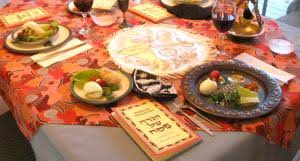
by
Shani, Dena, and Daniella
We break from our Pesach cleaning and menu planning
to shed light on a sensitive topic that is probably pertinent to you or to someone
at your Seder table. Four is a repeating theme of Pesach – the Ma Nishtana with the four questions, the
Four Sons, and the arba kosos, the
four cups of wine, to name a few.
While anyone can sing the Ma Nishtana,
and a lot of us can identify with at least one of the four sons, not everyone
will be drinking four cups of wine this
Pesach. We discuss (you guessed it) four
reasons why some will not be filling their cups with wine on Seder night – and why
we should show sensitivity toward them.
1)
Pregnant (or nursing) women: An expectant mother may be very uneasy about
not drinking wine for the arba kosos when
she normally would if she were not pregnant. She may feel that it will be
obvious she’s expecting since she’s opting for grape juice. If she has not told
everyone at the Seder table that she is pregnant and doesn’t want them to know
just yet, this can be an uncomfortable situation to navigate, especially
without non-alcoholic options on the table. We would like to think everyone is
keeping their eyes on their own cup, but people’s eyes do wander, and those people
may make assumptions. Let’s do our part to ease the worries of expecting
mothers who don’t want to use the Seder as their pregnancy announcement.
Nursing mothers also get a shout-out
here. The decision of how many of the four cups will be filled with wine is up
to the mother herself. Comments such as “I always drink the arba kosos while pregnant – it’s a
mitzvah after all!” and “Do you even know the effects of alcohol on your baby?”
should be kept to yourself. If you have a suspicion that you’re sharing the Seder
with a mother early on in her pregnancy, or you’re in the company of a nursing
mother, the best thing to say is nothing at all.
2)
Addiction (or supporting someone else with an addiction): Many people
struggle with alcohol addiction. Any Jewish holiday – even every Shabbos – involves
kiddush wine. We often don’t consider kiddush or arba kosos to be something that is difficult for some participants
at our Seder table. Sensitivity in this matter goes a very long way. If someone
at your table passes on the wine, don’t make a big deal out of it as you never
know what people are going through. If the person wants to explain their
choices that is their personal decision. For more details on alcohol addiction,
Chayeinu can help. Chayeinu of Baltimore provides addiction education to anyone
who needs it. You can reach them at chayeinubaltimore@gmail.com
or visit their website at chayeinubaltimore.org.
3) Medication:
Alcohol should not be consumed while a person is undergoing certain treatments or
taking certain medications. These include chemotherapy, insulin, and some
antibiotics. (Of course, always consult your own doctor.) Many illnesses that
require these treatment courses are “invisible” and would go unnoticed by those
not in the know. If someone you know is on a medication that restricts their
alcohol consumption, Pesach provides a wonderful opportunity for you to show
those close to you that you care by picking up a nice bottle of sparkling grape
juice or non-alcoholic wine.
4) Health
conditions: Cardiovascular illnesses, high blood pressure,
and high cholesterol are some medical conditions that prohibit someone
from consuming alcohol. Those living with chronic health issues face many
hardships in their day-to-day life. Holidays and family get-togethers bring to
the forefront that they are hurting in ways others might not be. If you know that someone at your Seder is struggling in this
way, view this as an opportunity to brighten up their Yom Tov. Make the Seder
fun by printing out the Ma Nishtana in
different languages to be read, or make a game (even for the adults) out of
hiding/finding the afikomen. And, of
course, don’t comment on their not drinking wine.
These are four reasons why a person may not
drink alcohol on Seder night, but there are more still. Keep a bottle of grape
juice on the table as another option. Even for those who can drink wine, four
cups can be a lot (especially if you’re using a big cup). Remember to be
sensitive and focus on the message of yetzias
Mitzrayim: Everyone walks their own path, but still, we walk side by side.
We hope your Sederim are beautiful, your Chol Hamoed trips give your kids
something to talk about, and your desserts taste like chometz! Chag kasher vsame’ach!






